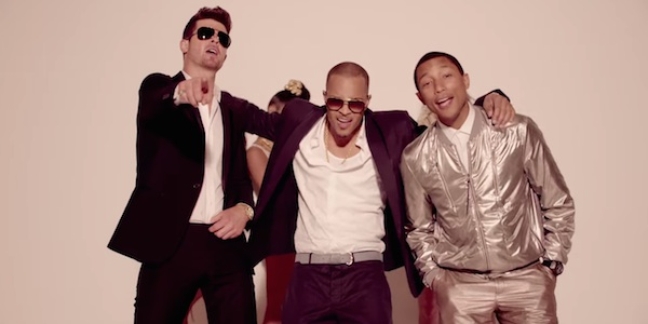
Marvin Gaye’s Children Release Statement on "Blurred Lines" Lawsuit

Recently, a jury ruled that Robin Thicke, Pharrell Williams, and T.I.‘s hit song “Blurred Lines” had copied Marvin Gaye‘s “Got to Give It Up”. The jury awarded the Gaye family $7.4 million, and the Gaye family sought an injunction to temporarily prohibit sales of the song. Today, Gaye’s children Nona Gaye, Frankie Gaye, and Marvin Gaye III have released a statement about the lawsuit (via Rolling Stone).
After thanking their mother and fans of their father’s work for their support, the Gayes wrote the letter in an attempt “to set the record straight on a few misconceptions echoing through some news and social media platforms about our intentions, our plans, and the so-called ‘larger’ ramifications of this case within the music industry.”
…Most songwriting begins with an organic approach; a songwriter brings his or her influences to the table and then works creatively from a blank slate in the crafting of their song to ensure originality and the integrity of their creation. If Mr. Thicke and Mr. Williams had tried to create a new song and coincidentally infused “Got to Give It Up” into their work, instead of deliberately undertaking to “write a song with the same groove,” we would probably be having a different conversation.
Like most artists, they could have licensed and secured the song for appropriate usage; a simple procedure usually arranged in advance of the song’s release. This did not happen. We would have welcomed a conversation with them before the release of their work. This also did not happen.
Instead of licensing our father’s song and giving him the appropriate songwriter credit, Robin Thicke and Pharrell Williams released “Blurred Lines” and then filed a pre-emptive lawsuit against us, forcing us into court. They sought to quickly affirm that their song was “starkly different,” than “Got to Give It Up.” The Judge denied their motion for Summary Judgement, and a jury was charged with determining the “extrinsic and intrinsic similarities” of the songs. The jury has spoken.
We wanted to also make clear that the jury was not permitted to listen to the actual sound recording of “Got to Give It Up.” Our dad’s powerful vocal performance of his own song along with unique background sounds were eliminated from the trial, and the copyright infringement was based entirely on the similarity of the basic musical compositions, not on “style,” or “feel,” or “era,” or “genre.” His song is so iconic that its basic composition stood strong. We feel this further amplifies the soundness of the verdict.
Like all music fans, we have an added appreciation for songs that touch us in mysterious ways. Mr. Thicke and Mr. Williams certainly have a right to be inspired by “Got to Give It Up” but as the jury ruled, they did not have the right to use it without permission as a blueprint for a track they were constructing.
Great artists like our dad intentionally build their music to last, but we as the caretakers of such treasures, have an obligation to be vigilant about preserving the integrity of the music so that future generations understand its origins and feel its effect as the artist intended, and to assure that it retains its value.
The letter goes on to respond to Thicke and Williams’ attorney Howard King’s comment, “We owe it to songwriters around the world to make sure this verdict doesn’t stand.”
With the digital age upon us, the threat of greater infringement looms for every artist. It is our wish that our dad’s legacy, and all great music, past, present, and future, be enjoyed and protected, with the knowledge that adhering to copyright standards assures our musical treasures will always be valued.
They close the letter by denying rumors that they’re considering legal action over Pharrell’s “Happy”. (Similarities between Gaye’s “Ain’t That Peculiar” and “Happy” have been pointed out in recent weeks.) Read the full letter here.
The Gaye family’s attorney also filed a new motion seeking to hold T.I. and Interscope liable for copyright infringement, Entertainment Weekly reports. The jury’s decision currently applies to Thicke, Williams, and the publishing company More Water From Nazareth Publishing, Inc.
Thicke and Williams’ attorney has announced intentions to appeal the decision.













Recent Comments